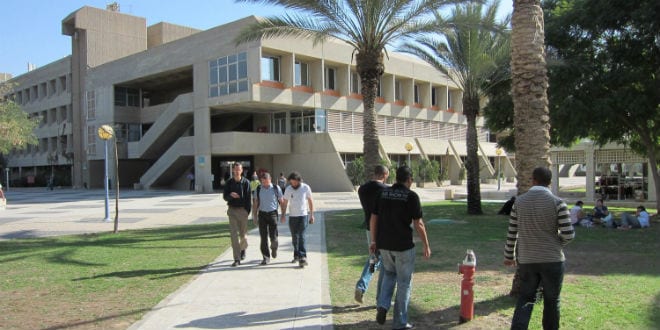Israeli researchers and even undergraduates are working hard to fight amyotrophic lateral sclerosis (ALS), also known as motor neurone and Lou Gehrig’s disease for the New York Yankee baseball hero who was felled 12 days before his 38th birthday by the debilitating and fatal neurodegenerative disorder.
Messages from motor neurons in the brain (called upper motor neurons) are transmitted to motor neurons in the spinal cord and to lower motor neurons and from the spinal cord and motor nuclei of the brain to a particular muscle or muscles.
In ALS, both the upper motor neurons and the lower motor neurons degenerate or die and stop sending messages to the muscles. Unable to function, the muscles gradually weaken, start to twitch and waste away Eventually, the brain loses its ability to initiate and control voluntary movements.
Early symptoms of ALS usually include muscle weakness or stiffness. Gradually all muscles under voluntary control are affected, and individuals lose their strength and the ability to speak, eat, move, and even breathe. Most people with ALS die from respiratory failure, usually within three to five years from when the symptoms first appear. However, about 10% of ALS patients survive for 10 or more years.
An Israeli named Avichai Kremer, now 44 and severely disabled, was at age 29 pursuing his master’s degree at the Harvard Business School and engaged to be married when he felt pain and weakness in his right arm and – after undergoing a battery of tests – was diagnosed with ALS. Shocked by the dreadful news, he nevertheless did not lose hope for himself, the more than 500 Israeli ALS victims and the 1-in-10,000 people around the world who have the disease.
Kremer became active in the Israel ALS Society established in 2010 to boost awareness of the disorder and has raised millions of dollars for ALS research, establishing Prize4Life, a non-profit organization dedicated to the discovery of treatments and a cure.
Various Israeli researchers including world-acclaimed neurology Prof. Dimitrios Karussis, have made progress and has been treating patients experimentally with stem cells.
Now, Ben-Gurion University of the Negev (BGU) undergraduates are going to Boston to compete in a prestigious synthetic biology competition with their experimental gene therapy for ALS.
The nine-member, multidisciplinary team called the OriginALS, will present their new therapeutic at the international Genetic Engineering Machine (iGEM) competition, which will be held this week.
The team, under the supervision of Prof. Lital Alfonta and Dr. Ramon Birnbaum of the life sciences department, will compete in the “Best Therapeutic Project” category. More than 350 teams from 41 countries will compete in a range of categories.
One member of the BGU team, Liat Tsoran, expects their findings will ultimately lead to a new therapeutic approach to slow down the disease, prolong survival and enhance the quality of life for ALS patients. Currently, ALS typically claims victim’s lives two to three years following diagnosis, but there are some “fortunate” victims such as the late British theoretical physicist Prof. Stephen Hawking and Kremer himself who have survived for decades.
“The disease is accelerated by the dysfunction of two types of supporting cells – astrocytes and microglia,” explained Tsoran, who lost her father to ALS when she was a teenager.
“Astrocytes that normally support proper nervous system become sick and change their shape and function, gaining a new neurotoxic activity that rapidly kills motor neurons. The microglia cells, which are located throughout the brain and spinal cord and act as an active immune defense in the central nervous system, over-secrete small molecules called cytokines that induce astrocytes to become reactive astrocytes,” she added.
To halt the disease’s progress, the BGU-iGEM team will use a synthetic biology system to eliminate reactive astrocytes and prolong ALS patients’ lives. The approach is based on two complementary pathways. First, they will delete the IKKB genes that are responsible for cytokine secretion in the microglia cells using a CRISPR-Cas9 genome editing system. These modified microglia cells won’t be able to secrete the relevant cytokines and therefore the creation of new reactive astrocytes will be prevented.
Secondly, they will identify and specifically activate programmed cell death only in reactive astrocytes without harming healthy astrocytes, using two specific gene markers expressed only in the “sick” form of the cells. Killing toxic cells while preventing the formation of new ones will significantly reduce sick neurons, increase healthy neuron survival and slow disease progression.
“Remarkably, our therapeutic approach might open a venue for treating not only ALS, but also other neurodegenerative diseases with similar mechanisms, such as Huntington’s, Alzheimer’s and Parkinson’s diseases and brain injuries,” said team member Avital Bailen, a native of Boston and third-year BGU life sciences student.
Recent research studies on ALS suggest that brain cells that have become toxic directly trigger the progression of the disease. These cells change their gene expression pattern and possess distinguishing genetic markers. In addition, they cause the death of other cells in the brain, including motor neurons, which carry information from the outside world – such as sensations of heat, cold, and pain – to the brain and spinal cord.
“Our objective, as the BGU-IGEM team OriginALS, is to prolong survival of ALS patients via a novel genetic engineering approach. In order to reach this objective, we combine two separate strategies as our therapeutic approach,” Bailen said.
“We identify and selectively eliminate only the toxic cells. To identify and target the toxic-cells only, we use distinguishing markers that are unique only to them. We also prevent the generation of new toxic cells by genetically targeting specific molecules that generate the toxic cells.”
In conclusion, said the team, “our approach combines an apoptotic destruction of toxic cells with the prevention of the formation of new toxic cells, thus aiming to significantly reduce the occurrence of toxic cells in the central neuronal system, which is aimed at a significant deceleration of the progression rate of ALS.”




